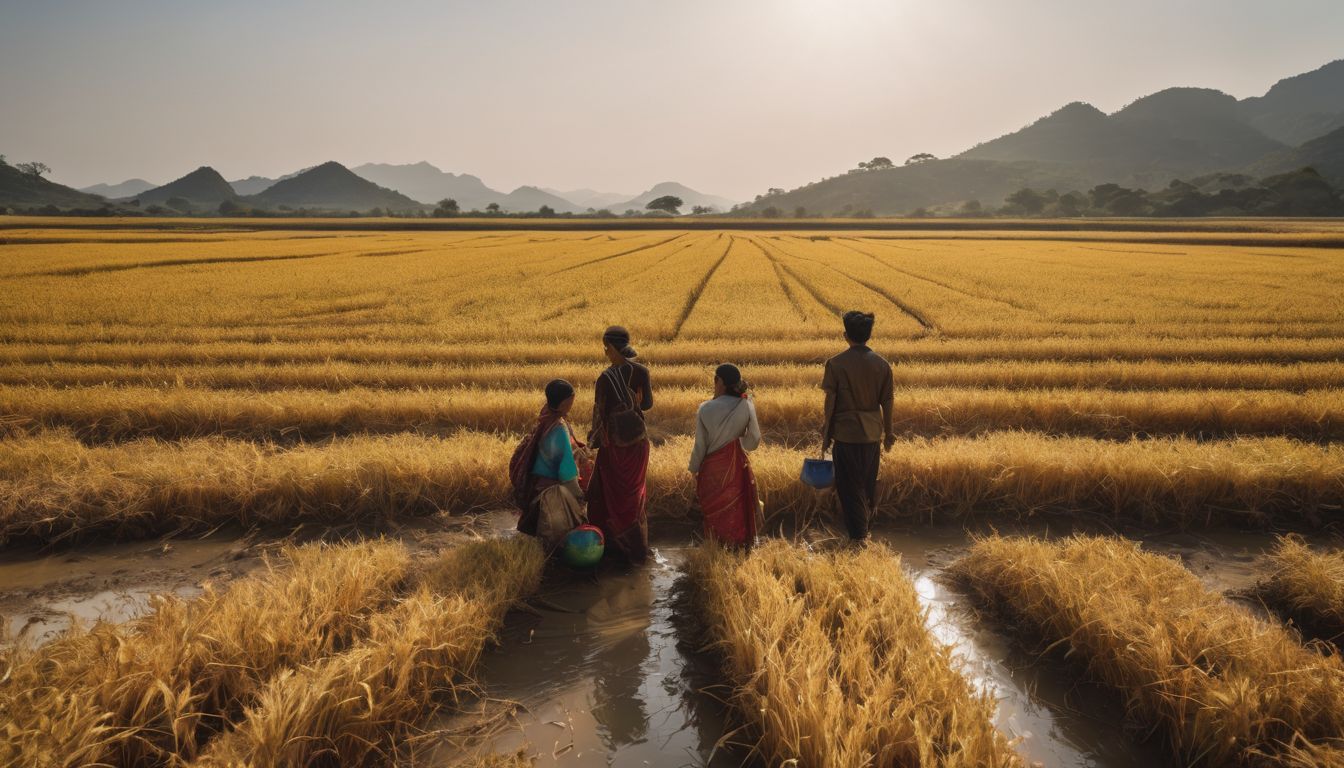As our planet faces increasing environmental challenges, it’s clear we need a united solution. The Sustainable Development Goals (SDGs) are a global answer, aiming to create a better world by 2030.
This article explores why the SDGs matter and how they can guide us towards a greener, more equitable future. Dive in to discover hope for tomorrow!
Key Takeaways
- Sustainable Development Goals (SDGs) are a set of 17 interconnected global objectives designed to establish peace and prosperity for people and the planet, now and into the future.
- Addressing core issues like poverty eradication, environmental sustainability, and ensuring global peace and prosperity by 2030 is at the heart of SDGs.
- Environmental sustainability underpins all SDG targets; protecting our planet is vital for meeting these goals from reducing hunger through sustainable farming to fostering resilient communities.
- Collaborative international partnerships across borders and sectors are necessary to achieve progress in key areas such as health, education, clean energy, climate action, economic growth, social inclusion, reduction of inequalities, and more.
- The IMF supports low – income countries with financial resources critical for promoting sustainable development which align with environmental conservation efforts needed to meet the SDGs.
What are Sustainable Development Goals (SDGs)?
Sustainable Development Goals (SDGs) are a universal call to action to end poverty, protect the planet, and ensure peace and prosperity for all. They consist of 17 goals and 169 targets aimed at addressing global issues.
Universal call to action
Every individual and organisation around the world has a vital role to play in accomplishing the Sustainable Development Goals (SDGs). It’s a universal call to action, signalling that from local communities to global leaders, everyone must come together.
The goal is clear: we need collaborative efforts to end poverty, safeguard our planet and make sure every person enjoys peace and prosperity by 2030.
Actions speak louder than words – we must channel our energy into practical measures that protect the environment whilst fostering economic growth and social equity. Only by uniting can we hope to build sustainable communities where inequality fades, hunger ceases and nature thrives alongside humanity.
This universal movement demands participation from all sectors; governments, businesses and citizens alike are summoned to drive this transformative plan for a healthier, more resilient world.
End poverty
To achieve the Sustainable Development Goal of ending poverty, it’s crucial to address the root causes and promote sustainable economic growth. This includes providing access to basic resources such as clean water, education, healthcare, and decent work opportunities in line with environmental sustainability.
Eradicating poverty also involves reducing inequalities within and among countries by implementing policies that empower those living in vulnerable situations.
Furthermore, ending poverty requires a global effort involving partnerships between governments, businesses, and communities to ensure that everyone can enjoy a decent standard of living without harming the environment.
Protect the planet
Protecting the planet is a critical component of the Sustainable Development Goals (SDGs). It involves addressing climate change, conserving oceans and forests, and promoting sustainable use of resources.
By safeguarding the environment, we can ensure a healthier planet for future generations, supporting sustainable development in all areas.
Taking action to protect the planet encompasses efforts to reduce pollution, combat deforestation, promote renewable energy sources and conservation practices. Each individual’s contribution plays an essential role in preserving our natural surroundings and fostering a sustainable world for all.
Embracing environmentally friendly practices both at home and in our communities is crucial for achieving global goals related to poverty eradication and ensuring peace and prosperity worldwide.
Ensure peace and prosperity
To achieve the Sustainable Development Goals (SDGs), it is essential to ensure peace and prosperity globally. This involves addressing social, economic, and environmental challenges, promoting justice and equality, and fostering inclusive societies.
By working together in partnership for development, we can create a world where all individuals have access to education, healthcare, clean water, and economic opportunities. Moreover, by supporting climate action and protecting the planet’s resources, we can contribute to building sustainable communities that are resilient in the face of future challenges.
Furthermore, ensuring peace and prosperity is crucial in reducing inequalities and eliminating poverty. It requires a collective effort towards creating a more peaceful and just world for current and future generations while also safeguarding the Earth’s natural resources.
The Impact of the Environment on SDGs
The environment underlies all the Sustainable Development Goals, from eliminating hunger to building sustainable communities. Read on to find out how environmental sustainability is crucial in achieving these goals.
Underlies all goals
The environment plays a crucial role in achieving the Sustainable Development Goals. It affects ending hunger, reducing inequalities, and building sustainable communities. Environmental sustainability is intertwined with every aspect of the 17 global goals and 169 targets, making it a fundamental factor in ensuring the success of the SDGs.
To understand why environmental considerations are integral to all SDGs, we must examine how the planet’s health impacts poverty reduction, peace, and prosperity. Each goal relies on a healthy environment for its effective implementation.
In order to achieve these ambitious targets and ensure a sustainable future for all, prioritising environmental sustainability is imperative.
Eliminating hunger
Underlying all goals is the need to eliminate hunger. Achieving this goal requires sustainable methods of food production, distribution, and access. By addressing environmental challenges such as climate change and unsustainable farming practices, we can ensure that everyone has enough nutritious food to lead healthy lives.
This not only supports human well-being but also contributes to a more sustainable planet for future generations.
Reducing food waste, promoting sustainable agriculture, and ensuring fair trade practices are crucial in the fight against hunger. Environmental conservation plays a vital role in securing food sources and preserving ecosystems necessary for agricultural productivity.
Reducing inequalities
Reducing inequalities is a crucial part of the Sustainable Development Goals (SDGs), aiming to address disparities in income, gender, and access to basic services. It involves ensuring equal opportunities for all individuals, regardless of their background or circumstances.
This goal emphasises the need for fair distribution of wealth and resources, promoting social inclusion and economic empowerment for vulnerable groups. By tackling inequality head-on, the SDGs create a more just and sustainable world where everyone has the chance to thrive.
To achieve this goal effectively, global collaboration and targeted interventions are essential. Effective policies can help bridge gaps in education, healthcare, employment opportunities and political representation.
Building sustainable communities
To address the issue of reducing inequalities, building sustainable communities is crucial. Sustainable communities promote social equity, economic prosperity, and environmental conservation.
They aim to create inclusive spaces where everyone has access to resources and opportunities for a better quality of life.
Communities built on sustainability foster collaboration among individuals, businesses, and local authorities to achieve common goals. By prioritising clean energy, green spaces, affordable housing, and accessible public transportation, these communities contribute to a healthier environment while improving the well-being of their residents.
Why SDGs are Important
SDGs are important because they provide a global blueprint for addressing crucial issues such as poverty, inequality, and the environment. The goals aim to fight universal problems and ensure dignity and prosperity for all.
Fight global problems
Sustainable Development Goals (SDGs) play a crucial role in addressing and combating global problems. By focusing on eradicating poverty, promoting environmental sustainability, and fostering peace and prosperity, the SDGs provide a universal blueprint for dignity and prosperity.
With 17 goals and 169 targets, these goals encapsulate a comprehensive global agenda to address issues such as climate change, inequality, and increasing access to education and healthcare.
Achieving the SDGs requires concerted efforts from governments, businesses, civil society organisations, and individuals worldwide. Through sustainable development initiatives aimed at addressing key sectors like health and education while fostering global partnerships, progress can be made towards meeting the ambitious targets set by the SDGs.
The Sustainable Development Goals are more than just an idealistic vision; they represent a tangible pathway towards fighting global problems through coordinated actions across various sectors.
Blueprint for dignity and prosperity
The Sustainable Development Goals are a blueprint for dignity and prosperity. They present a universal call to action to end poverty, protect the planet, and ensure peace and prosperity.
With 17 goals and 169 targets, the SDGs provide a global agenda for addressing key sectors such as health, education, and gender equality. Additional spending is required to achieve these goals, but they offer a roadmap for sustainable development that benefits all.
Next heading: “Global agenda of the SDGs”
Global agenda
Sustainable Development Goals (SDGs) are a blueprint for global development, consisting of 17 goals and 169 targets. These goals address universal action, with additional spending required to achieve them.
The SDGs form part of the sustainable development agenda and serve as a call to action for individuals who support conservation and environmental initiatives. They play a crucial role in achieving global prosperity and dignity by addressing key sectors such as health, education, and economic growth.
The SDGs not only fight global problems but also establish a global agenda that requires cooperation from all nations. Achieving these goals is vital in promoting sustainable development worldwide, which aligns with the interests of environmentally conscious individuals seeking to make a positive impact on the planet.
Consists of 17 goals and 169 targets
The Sustainable Development Goals (SDGs) consist of 17 goals and 169 targets, covering a wide range of global issues. These goals provide a shared blueprint for peace and prosperity for people and the planet now and into the future.
Each goal addresses specific challenges such as poverty, inequality, climate change, environmental degradation, peace, and justice among others. By setting clear targets for each goal, the SDGs aim to prompt action from governments, businesses, organisations, and individuals to work together towards achieving these ambitious objectives.
Working towards these 17 interconnected goals with their associated targets requires collaboration on a global scale to address pressing challenges facing humanity today. It’s vital that all stakeholders remain committed to ensuring the successful implementation of these goals in order to secure a sustainable future for generations to come.
Achieving the SDGs
Addressing key sectors such as health, education, and infrastructure is crucial for achieving the Sustainable Development Goals. Global partnerships and the IMF’s assistance to low-income countries play a significant role in making progress towards these goals.
Importance of global partnerships
Global partnerships are crucial for achieving the Sustainable Development Goals (SDGs). By working together across borders and sectors, countries can share knowledge, resources, and solutions to address complex environmental challenges.
These partnerships allow for the exchange of best practices and technologies that can drive progress towards a more sustainable future. It is essential for environmentally conscious individuals to support and engage in global partnerships to ensure that the SDGs are met on a global scale.
Furthermore, global partnerships enable collaborative efforts in addressing key sectors such as health, education, clean energy, and climate action. Through these collaborations, we can leverage each other’s strengths to create meaningful impact and accelerate progress towards achieving a more sustainable world.
Addressing key sectors: health, education, etc.
The Sustainable Development Goals (SDGs) encompass key sectors such as health and education, vital for achieving global prosperity.
- Health:
- Promoting good health and well – being is crucial for sustainable development.
- Providing access to healthcare services and ensuring universal health coverage.
- Improving sanitation and hygiene to prevent diseases.
- Education:
- Ensuring inclusive and equitable quality education for all.
- Promoting lifelong learning opportunities.
- Fostering skills development for decent work and entrepreneurship.
IMF’s role in helping low-income countries
The International Monetary Fund (IMF) plays a critical role in supporting low-income countries by providing financial assistance, policy advice, and technical expertise. This aid helps these nations to strengthen their economies, reduce poverty, and promote sustainable development.
Through its various programs and initiatives, the IMF enables countries to implement sound economic policies that support environmental conservation and address climate change challenges.
By working with the IMF, low-income countries can access essential resources to invest in renewable energy projects, improve infrastructure for clean water and sanitation, and advance sustainable agriculture practices.
The IMF’s efforts contribute to achieving the Sustainable Development Goals (SDGs) by supporting environmentally conscious initiatives that foster conservation and environmental protection.
Conclusion
In conclusion, Sustainable Development Goals are crucial for addressing global challenges. Achieving the goals requires collaborative efforts across nations and sectors. The SDGs provide a blueprint for creating a sustainable and prosperous future for all.
They offer a universal call to action and guide us towards building a better world for generations to come. With their far-reaching impact, the importance of Sustainable Development Goals cannot be overstated.
FAQs
1. What are Sustainable Development Goals?
Sustainable Development Goals are a set of global goals designed to create a better future by addressing critical issues such as poverty, climate change, and inequality.
2. Why are Sustainable Development Goals important?
The Importance of Sustainable Development Goals lies in their aim to ensure the well-being of our planet and its inhabitants for generations to come by achieving these goals through collaborative efforts.
3. Who should work towards achieving the Sustainable Development Goals?
Everyone should contribute – governments, businesses, communities, and individuals all play vital roles in working towards achieving these ambitious yet essential targets for sustainable development.
4. Can achieving the Sustainable Development Goals make a real difference?
Yes, successfully hitting these targets can lead to significant improvements in health, education, equality and environment protection worldwide thereby making lasting positive impacts on peoples’ lives and safeguarding the earth’s resources.





